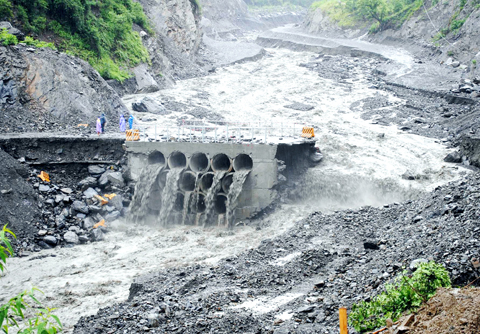Torrential rain that began on Monday night damaged roads and bridges in central and southern Taiwan yesterday, affecting areas hit by Typhoon Morakot last year particularly badly.
The Directorate-General of Highways (DGH) said it had closed 11 highways and bridges nationwide because of dangerously high river levels or landslides.
The DGH closed the temporary Shuangyuan Bridge on Highway No. 17 and the Sinfa Bridge on Highway No. 27. It said three sections of Highway No. 27 were damaged, which affects traffic between villages in Kaohsiung County’s Liouguei (六龜) Township.

PHOTO: CNA
“The damaged sections will not be opened for traffic until there are no more safety concerns,” the DGH said in a statement.
Damage was also reported on sections of Highway Nos. 18, 20, 21 and 24, which are under the DGH’s authority.
County Highway Nos. 148 and 149 in Yunlin County and Chiayi County were also damaged.
The Central Weather Bureau (CWB) said Sinying (新營) was hardest hit by the rain during the 13-hour period from midnight to 1pm yesterday, receiving 410.5mm of precipitation.
Beimen Township (北門) in Tainan County and Yijhu Township (義竹) in Chiayi County were drenched by 271mm and 242.5mm of precipitation during the same 13-hour period respectively.
Rainfall in Siaying Township (下營) in Tainan County and Puzih City (朴子) in Chiayi County also exceeded the “torrential rain” level of 200mm in a single day, with 216mm and 208.5mm respectively.
The bureau said the nation would still be under the influence of the Southwest air stream today, with chances of heavy or torrential rain remaining high.
Traffic authorities warned people to stay away from mountainous areas until the rain stops.
The Central Emergency Operation Center opened at noon yesterday.
Shih Tseng-kang (石增剛), director of the Executive Yuan’s National Disaster Prevention and Protection Office, said the center would accept requests for disaster prevention assistance and relief from local governments.
Noting that more than 20 weather stations had recorded precipitation of more than 200mm as of 10am yesterday, Shih said his office had maintained close contact with the Water Resources Agency and the Soil and Water Conservation Bureau.
Meanwhile, the 8th Army Corps stationed in Fengshan (鳳山), Kaohsiung County, and the Marine Corps headquartered in Kaohsiung City’s Zuoying (左營) said they had dispatched soldiers to various townships in the region to prepare for possible disaster relief work.
The 8th Army Corps said it had deployed 730 soldiers, along with 90 trucks and amphibious armored troop transports to 23 townships, while the Marine Corps said it had dispatched four inflatable boats and four amphibious vehicles to Sinying City, in addition to deploying marines in mountainous areas of Kaohsiung County.
However, the downpours have helped replenish the major reservoirs in the south, filling Zengwun Reservoir (曾文水庫) to 45.75 percent of its capacity and the Wushantou (烏山頭) and Nanhua (南化) reservoirs to 80 percent of their capacity.
ADDITIONAL REPORTING BY SHIH HSIU-CHUAN AND CNA

DAREDEVIL: Honnold said it had always been a dream of his to climb Taipei 101, while a Netflix producer said the skyscraper was ‘a real icon of this country’ US climber Alex Honnold yesterday took on Taiwan’s tallest building, becoming the first person to scale Taipei 101 without a rope, harness or safety net. Hundreds of spectators gathered at the base of the 101-story skyscraper to watch Honnold, 40, embark on his daredevil feat, which was also broadcast live on Netflix. Dressed in a red T-shirt and yellow custom-made climbing shoes, Honnold swiftly moved up the southeast face of the glass and steel building. At one point, he stepped onto a platform midway up to wave down at fans and onlookers who were taking photos. People watching from inside

MAKING WAVES: China’s maritime militia could become a nontraditional threat in war, clogging up shipping lanes to prevent US or Japanese intervention, a report said About 1,900 Chinese ships flying flags of convenience and fishing vessels that participated in China’s military exercises around Taiwan last month and in January last year have been listed for monitoring, Coast Guard Administration (CGA) Deputy Director-General Hsieh Ching-chin (謝慶欽) said yesterday. Following amendments to the Commercial Port Act (商港法) and the Law of Ships (船舶法) last month, the CGA can designate possible berthing areas or deny ports of call for vessels suspected of loitering around areas where undersea cables can be accessed, Oceans Affairs Council Minister Kuan Bi-ling (管碧玲) said. The list of suspected ships, originally 300, had risen to about

A Vietnamese migrant worker yesterday won NT$12 million (US$379,627) on a Lunar New Year scratch card in Kaohsiung as part of Taiwan Lottery Co’s (台灣彩券) “NT$12 Million Grand Fortune” (1200萬大吉利) game. The man was the first top-prize winner of the new game launched on Jan. 6 to mark the Lunar New Year. Three Vietnamese migrant workers visited a Taiwan Lottery shop on Xinyue Street in Kaohsiung’s Gangshan District (崗山), a store representative said. The player bought multiple tickets and, after winning nothing, held the final lottery ticket in one hand and rubbed the store’s statue of the Maitreya Buddha’s belly with the other,

Japan’s strategic alliance with the US would collapse if Tokyo were to turn away from a conflict in Taiwan, Japanese Prime Minister Sanae Takaichi said yesterday, but distanced herself from previous comments that suggested a possible military response in such an event. Takaichi expressed her latest views on a nationally broadcast TV program late on Monday, where an opposition party leader criticized her for igniting tensions with China with the earlier remarks. Ties between Japan and China have sunk to the worst level in years after Takaichi said in November that a hypothetical Chinese attack on Taiwan could bring about a Japanese